Why & How to Host Virtual Events with WordPress

With global restrictions on in-person gatherings, event organizers have been scrambling to move their meetings, social gatherings and classes online. The leading online meeting platforms from Google, Microsoft and Zoom have responded with a surge of new features and price reductions to win these new customers, although they each have a different focus. Google Meet leverages Google’s Gmail, Microsoft Teams has become the go-to corporate option, while Zoom has been embraced by virtually everyone else.
But you don’t have to utilize a third party service – you also have the option to use your own website. WordPress event calendar plugins have begun to respond to this new landscape. First, we will characterize some of the unique challenges of moving events online, then deep dive into four good options you can use to host events online.
Challenges of Online Events
Events present a set of challenges. But when planning and managing an online event there are a few you’ll want to keep in mind.
The Time Zone
When scheduling an event at a physical venue, the time is always local. The concert starts at 8pm in Seattle no matter where you are in the world.
Things get more complicated online. A Zoom meeting might be in New York, but attendees in London and Hong Kong need to know when to join. Even worse, your event organizer might be in New Zealand, scheduling events in Buenos Aires for attendees in Cape Town. Every online event calendar needs to deal with the Twilight Zone of time zones.
Where is the link?
All the online meeting platforms work by generating a link to be sent to attendees of the meeting. They click the link to join. Invariably not everyone gets it, the link needs to be changed last minute or it is buried in email.
Zoom’s security woes have taught organizers to be careful with links. They need to be delivered securely and reliably to only confirmed attendees.
Mix and Match
Some events are purely online. Some are in-person. Some are hybrid events where people can attend a class in-person or connect online. Still other events might be in-person, but with a livestream online.
An event calendar needs to seamlessly combine these scenarios, so registration flows match the use case. For example, in-person attendees should not receive a join link and online attendees should not receive scannable tickets.
The Best Online Event Calendar Plugins
Here are four event calendars that have targeted features to address these pain points. We have exercised all features and verified they are production-ready for your application.
EventAgent.ai

Newly released and fully online-native, EventAgent.ai provides the best overall online experience among general calendars. While its distinctive feature is data-driven AI marketing for automated event promotion, it also packs several advanced online and hybrid event features.
The EventAgent.ai calendar detects the visitor’s time zone and shifts online events to local time. These events are clearly marked in all views. In-person events are displayed in the time zone of the venue.
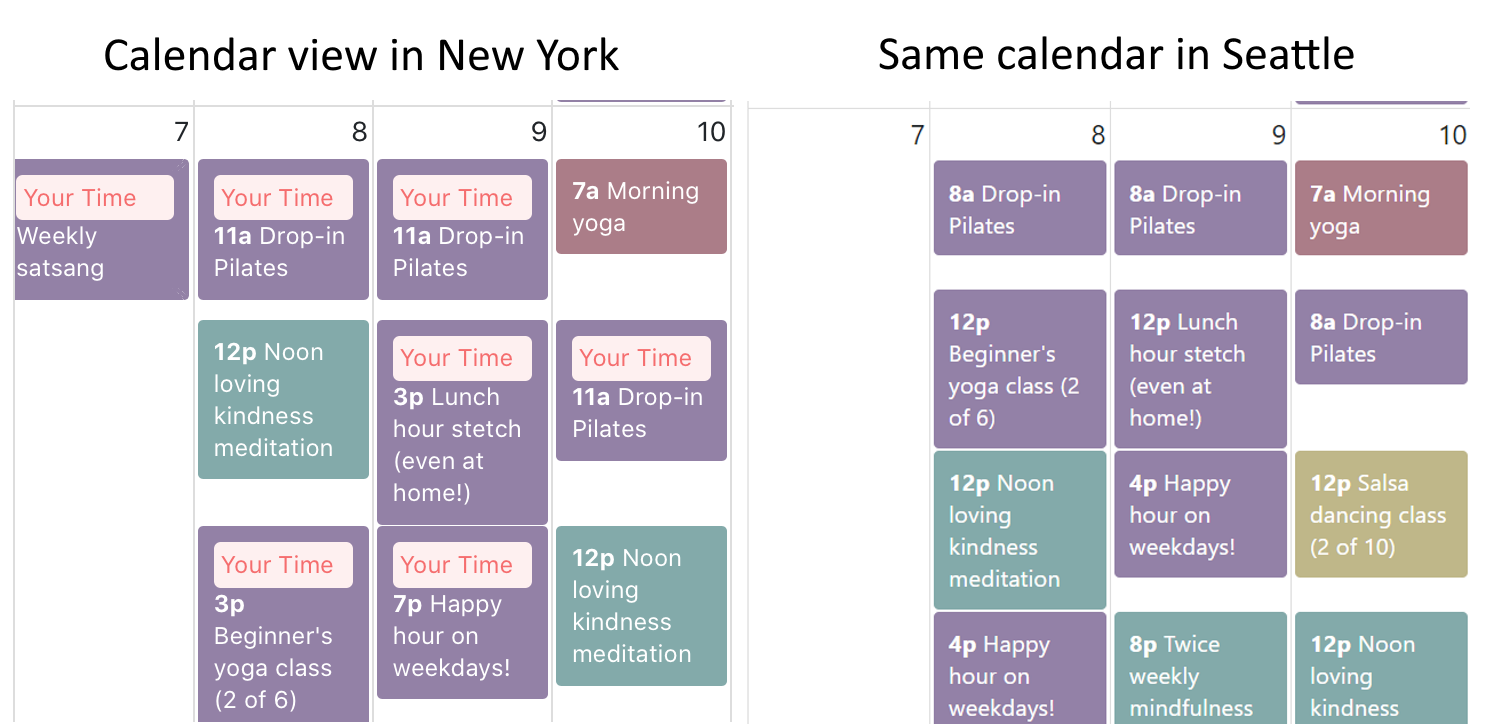
This minimizes scheduling errors. A New Yorker visiting Seattle knows to show up for yoga at 7am. If she stays home, Pilates at 11am.
Zoom’s recommended security protocol is to implement a Zoom waiting room. This is a virtual lobby where the Zoom host personally vets attendees as they arrive. This is very cumbersome for hosts or service providers who need an additional receptionist in the lobby to verify attendees as they enter the lobby, just like an in-person office.
EventAgent.ai offers robust vetting at the time of registration, so this does not become a bottleneck at the door. An event can be set to Moderated, which delays confirmation until the registrar approves the attendee. EventAgent.ai provides a comprehensive set of moderation tools, including custom responses to the registration form and a private moderator view of the registration that includes notes on the attendee and their previous attendance record, which is also useful to verify prerequisites to courses.
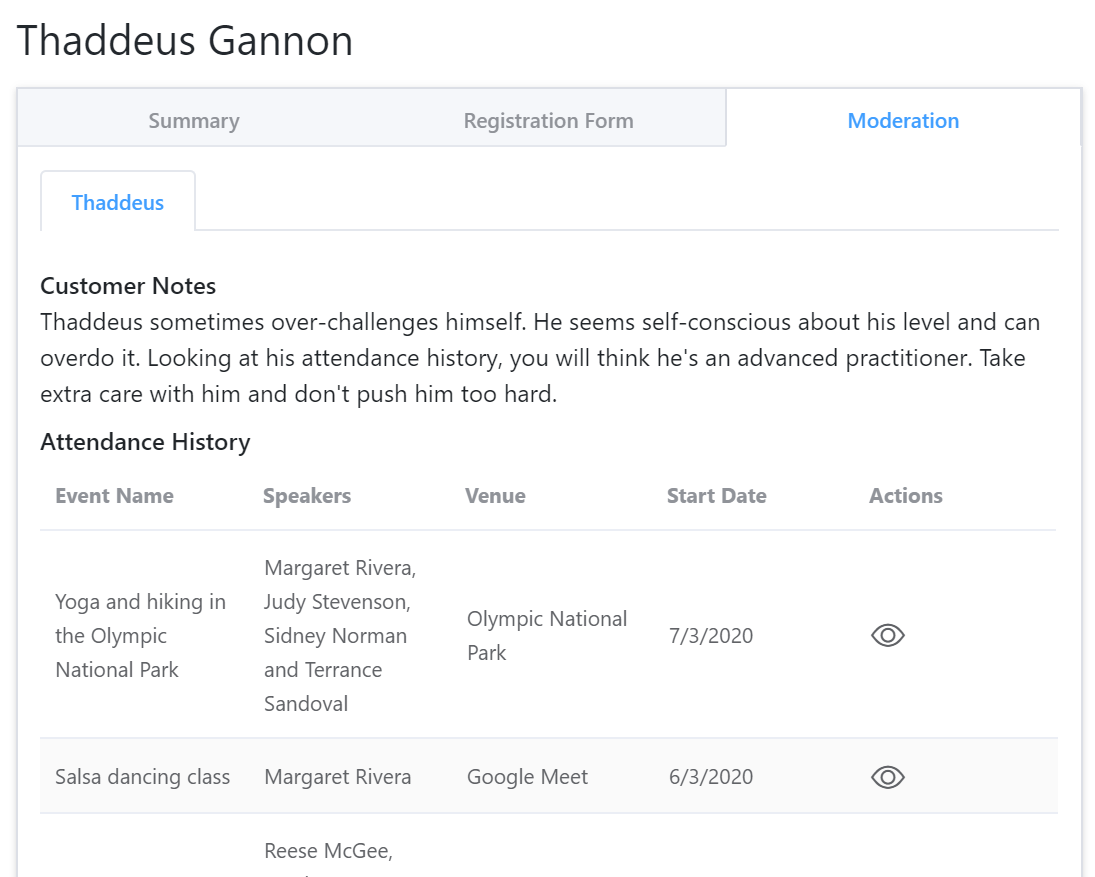
EventAgent.ai handles arrival instructions differently between in-person and online events. In-person attendees receive an email with driving directions and arrival instructions 24 hours before the start time. Online, hosts are often changing the join URL hours before the event and attendees arrive at their computer 5 minutes early unable to find the link. Online attendees do not receive the driving directions reminder, but the link will arrive in their email boxes 30 minutes before the start time. This greatly facilitates attendance.
EventAgent.ai tailors the check-in experience to event type. In-person events have scannable digital tickets attendees display on phones at the door, while online attendees are automatically checked in when they join the Zoom meeting.
Finally, EventAgent.ai provides true two-way synchronization with Zoom. Change an event time and the associated Zoom meeting updates automatically. If the join link changes, the new link is automatically pushed out to attendees. If the meeting is accidentally deleted in Zoom, EventAgent.ai will recover it if the event goes on as planned.
The Event Calendar

The Event Calendar is the most widely installed event plugin and is a perennial fixture on top 10 lists. It is backed by an impressive catalog of add-ons making it very flexible. The Event Calendar: Virtual Events is a newly released add-on to address online events. When installed, it adds the following section to the event editor.
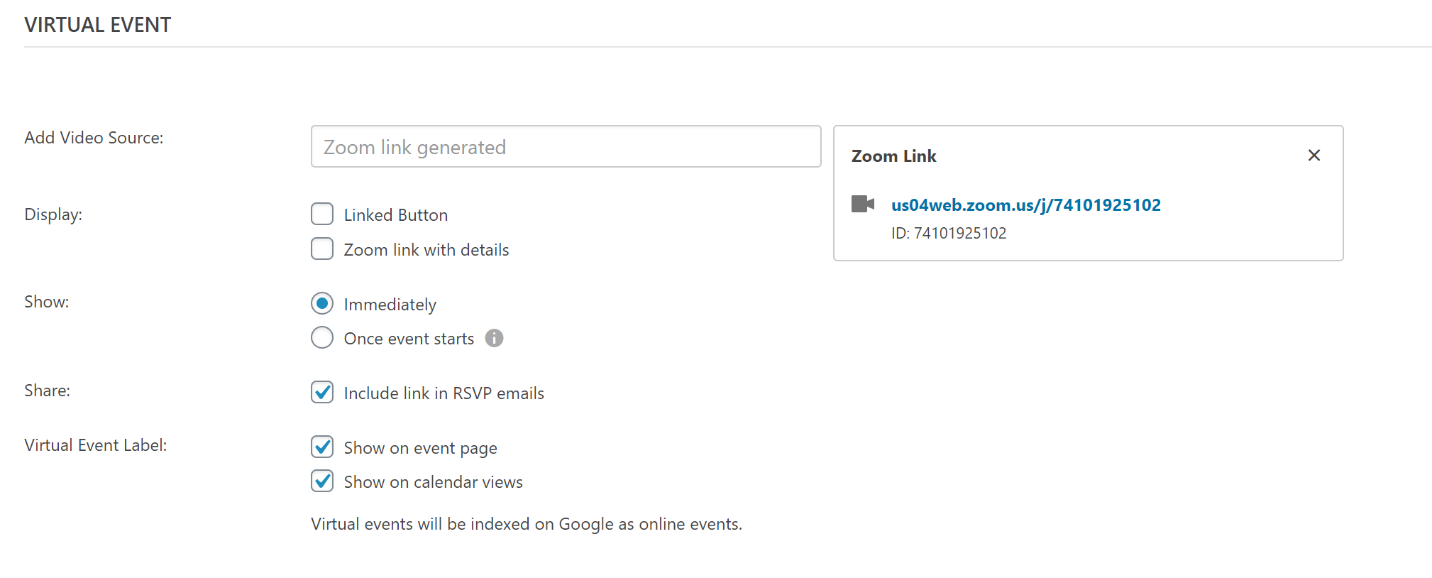
Virtual Events can connect to a Zoom account which allows it to create Zoom links from the event editor. When you save this event, it will create a corresponding meeting in your Zoom account. Most of the other options concern where to display the Zoom link. Including the link in RSVP emails ensures only people registered receive the link.
However, this is not a true two-way sync. Changing the event time is not reflected in the Zoom meeting, for example, leaving the new time without a working Zoom link. Deleting the Zoom meeting does not remove the Zoom link from the event, so people will receive a dead link. This is little more than a convenient copy and paste of the link.
The Event Calendar has good support for time zones. You can set time zones per event and display the time zone to attendees. However, they still must calculate event times manually based on their local time zone.
Modern Event Calendar

Modern Event Calendar is another leading freemium plugin. They have concentrated on making your online events easy to find by search engines. Google has released a new schema for online and events moved online that will direct visitors to an online link. If you depend heavily on SEO for attendees to find your events, this is a valuable upgrade.

Modern Event Calendar also allows events to display in the local time of your site visitors. This is exactly what online attendees need to see. However, this is not the right approach for in-person events. A New Yorker visiting Seattle would show up at our 8pm concert at 11pm, because that is the time displayed in their calendar.
Bookly
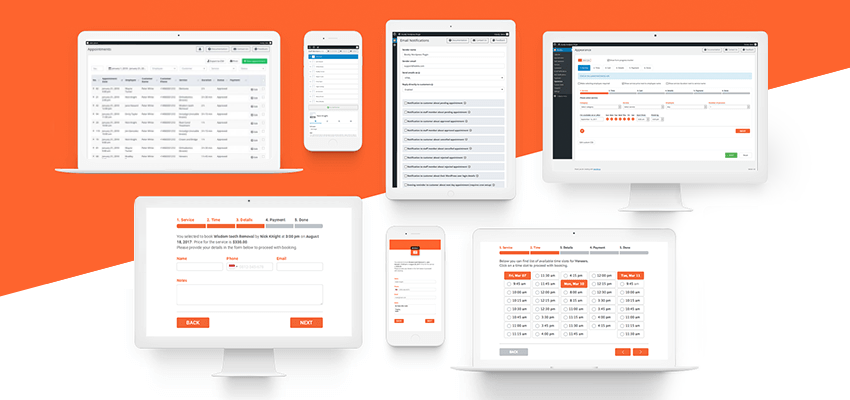
Bookly is an event plugin tailored to the specific use case of individuals reserving appointments with service providers. This kind of workflow is poorly suited to a standard calendar plugin, so it is good to see this model is getting some attention, as well.
All of the plugins that offer Zoom integration require connection to a Zoom app that is created from the Zoom Marketplace. Depending on the kind of integration the plugin requires, creation of the app will provide one or two keys that must be copied to the plugin’s settings. Bookly does it this way.
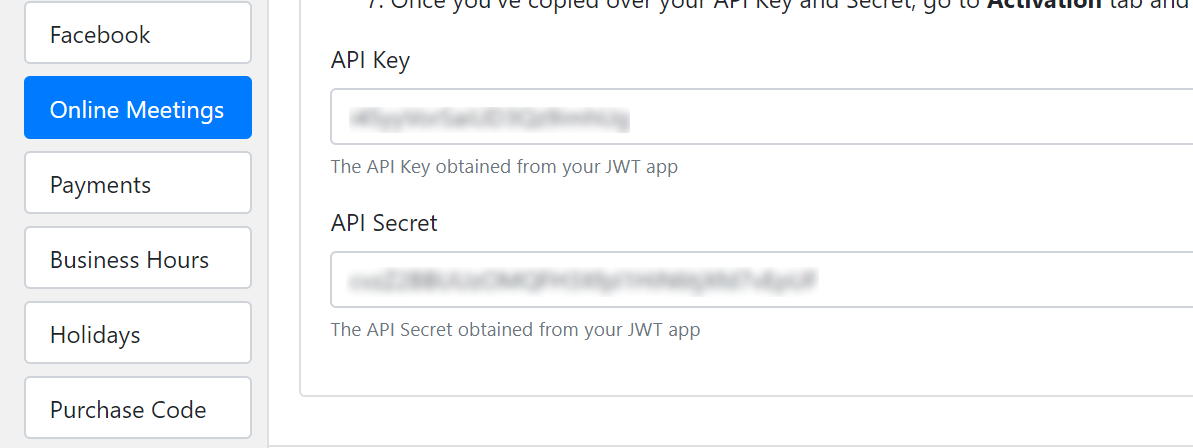
Thereafter, Bookly provides a token to insert the Zoom link in any custom created view. This allows the greatest flexibility for privacy. The link can be displayed after the visitor books an appointment or sent in an email confirmation.
When the service provider reviews appointments, they have a button to begin the Zoom session in their dashboard, which makes the workflow seamless.
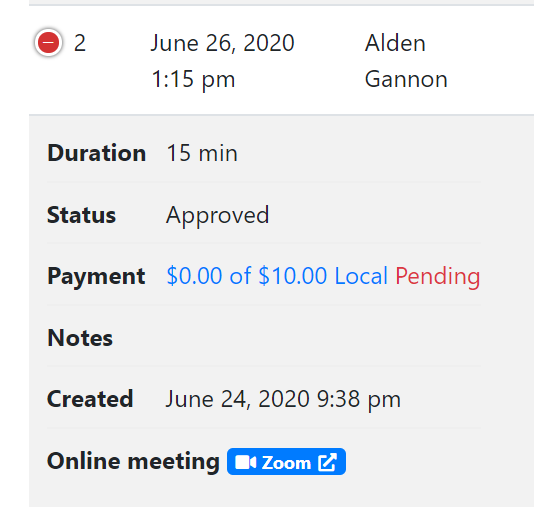
Unfortunately, like The Event Calendar, Bookly’s Zoom integration is not two-way. Edits either from Zoom or from Bookly can result in broken meetings.
Bookly does not support time zones. Neither does it alert visitors when they are viewing the schedule from a different time zone than the service provider. This can easily result in missed appointments due to scheduling errors.
Which Plugin Is Right for Me?
If you are already invested in The Event Calendar ecosystem, the Virtual Events plugin is a worthy upgrade. Zoom integration automates creation of meeting URLs and its flexible time zones make things much easier for remote attendees.
If you primarily rely on search engines for event discovery, Modern Event Calendar has the best SEO integration to alert your attendees that events have moved online.
Among the several plugins that target booking service appointments, Bookly is ahead of the pack with a seamless end-to-end workflow for online events in your local time zone.
If you wish to give the best experience to online and hybrid event attendees, hosts and registrars, EventAgent.ai is the way to go. Its built-in automated promotion tools are an added bonus.
Conclusion
As the world slowly opens back up to in-person gatherings, we may be in an extended period of online and hybrid events. Many organizations have won new online customers, expanding their reach beyond local communities. Losing these new customers as they transition back to in-person services is an option many want to avoid, which necessitates a long-term online strategy. The plugins in this review form a vital piece of that strategy.



